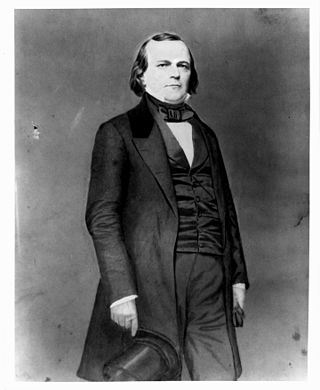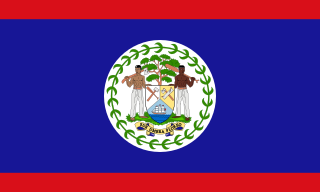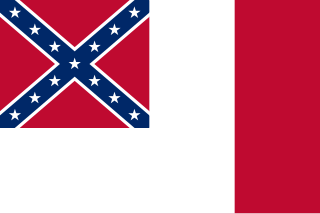
The American Civil War was a civil war in the United States between the Union and the Confederacy, which was formed in 1861 by states that had seceded from the Union. The central conflict leading to war was a dispute over whether slavery should be permitted to expand into the western territories, leading to more slave states, or be prohibited from doing so, which many believed would place slavery on a course of ultimate extinction.

British Honduras was a Crown colony on the east coast of Central America, south of Mexico, from 1783 to 1964, then a self-governing colony, renamed Belize in June 1973, until September 1981, when it gained full independence as Belize. British Honduras was the last continental possession of the United Kingdom in the Americas.

Judah Philip Benjamin was an American lawyer and politician who served as a United States senator from Louisiana, a Cabinet officer of the Confederate States and, after his escape to Britain at the end of the American Civil War, an English barrister. Benjamin was the first Jew to hold a Cabinet position in North America and the first to be elected to the United States Senate who had not renounced his faith.

Confederados is the Brazilian name for Confederate expatriates, all white Southerners, who fled the Southern United States during Reconstruction, and their Brazilian descendants. They were enticed to Brazil by offers of cheap land from Emperor Dom Pedro II, who had hoped to gain expertise in cotton farming. The regime in Brazil had a number of features that attracted the Confederados, among these political decentralization, and a relatively high commitment to free trade. The continuing legality of slavery was another factor, though few Confederados actually acquired slaves in Brazil.
The history of Georgia in the United States of America spans pre-Columbian time to the present-day U.S. state of Georgia. The area was inhabited by Native American tribes for thousands of years. A modest Spanish presence was established in the late 16th century, mostly centered on Catholic missions. The Spanish had largely withdrawn from the territory by the early 18th century, although they had settlements in nearby Florida. They had little influence historically in what would become Georgia.
At the time of the American Civil War (1861–1865), Canada did not yet exist as a federated nation. Instead, British North America consisted of the Province of Canada and the separate colonies of Newfoundland, New Brunswick, Prince Edward Island, Nova Scotia, British Columbia and Vancouver Island, as well as a crown territory administered by the Hudson's Bay Company called Rupert's Land. Britain and its colonies were officially neutral for the duration of the war. Despite this, tensions between Britain and the United States were high due to incidents such as the Trent Affair, blockade runners loaded with British arms supplies bound for the Confederacy, and the Confederate Navy commissioning of the CSS Alabama from Britain.

The history of the Southern United States spans back thousands of years to the first evidence of human occupation. The Paleo-Indians were the first peoples to inhabit the Americas and what would become the Southern United States. By the time Europeans arrived in the 15th century, the region was inhabited by the Mississippian people, well known for their mound-building cultures, building some of the largest cities of the Pre-Columbian United States. European history in the region would begin with the earliest days of the exploration. Spain, France, and especially England explored and claimed parts of the region.

John Jones McRae was an American politician in Mississippi. A Democrat, he served in the Mississippi House of Representatives, the U.S. Senate, and as governor of Mississippi.

The written history of Virginia begins with documentation by the first Spanish explorers to reach the area in the 16th century, when it was occupied chiefly by Algonquian, Iroquoian, and Siouan peoples. In 1607, English colonization began in present-day Virginia with Jamestown, which became the first permanent English settlement in North America.
South Carolina was one of the Thirteen Colonies that first formed the United States. European exploration of the area began in April 1540 with the Hernando de Soto expedition, which unwittingly introduced diseases that decimated the local Native American population. In 1663, the English Crown granted land to eight proprietors of what became the colony. The first settlers came to the Province of Carolina at the port of Charleston in 1670. They were mostly wealthy planters and their slaves coming from the English Caribbean colony of Barbados. By 1700 the colony was exporting deerskin, cattle, rice, and naval stores. The Province of Carolina was split into North and South Carolina in 1712. Pushing back the Native Americans in the Yamasee War (1715–1717), colonists next overthrew the proprietors' rule in the Revolution of 1719, seeking more direct representation. In 1719, South Carolina became a crown colony.

The Upland South and Upper South are two overlapping cultural and geographic subregions in the inland part of the Southern United States. They differ from the Deep South and Atlantic coastal plain by terrain, history, economics, demographics, and settlement patterns.

An American Brazilian is a Brazilian person who is of full, partial or predominant American descent or a U.S.-born immigrant in Brazil.

Confederate colonies were made up of Confederate refugees who were displaced or fled their homes during or immediately after the American Civil War. They migrated to various countries, but especially Brazil, where slavery remained legal, and to a lesser extent Mexico and British Honduras.

The history of Belize dates back thousands of years. The Maya civilization spread into the area of Belize between 1500 BC to 1200 BC and flourished until about 1000 AD. Several Maya ruin sites, including Cahal Pech, Caracol, Lamanai, Lubaantun, Altun Ha, and Xunantunich reflect the advanced civilization and much denser population of that period. The first recorded European incursions in the region were made by Spanish conquistadors and missionaries in the 16th century. One attraction of the area was the availability of logwood, which also brought British settlers.
The western Caribbean zone is a region consisting of the Caribbean coasts of Central America and Colombia, from the Yucatán Peninsula in southern Mexico to the Caribbean region in northern Colombia, and the islands west of Jamaica are also included. The zone emerged in the late sixteenth century as the Spanish failed to completely conquer many sections of the coast, and northern European powers supported opposition to Spain, sometimes through alliances with local powers.

Newfoundland was an English and, later, British colony established in 1610 on the island of Newfoundland, now the province of Newfoundland and Labrador. That followed decades of sporadic English settlement on the island, which was at first seasonal, rather than permanent. It was made a Crown colony in 1824 and a dominion in 1907. Its economy collapsed during the Great Depression and on 16 February 1934, the Newfoundland legislature agreed to the creation of a six-member Commission of Government to govern the country. In 1949, the country voted to join Canada as the province of Newfoundland.

The politics of Georgia change frequently and often follow the rest of the United States in major historical landmarks. The state has a long history, starting in the 18th century as a British colony. The cultural makeup of the early colony led to a ban on slavery being overturned soon after its implementation, setting the stage for the many plantations in the state. Rival governments were formed during the Revolutionary War, with the Patriot government surviving and forming a unified state government after the war. Georgian politics then followed the Democratic-Republican Party before the American Civil War and the Democrats afterward. In fact, the state never voted Republican until 1964, making it the last continental state to do so. Since then, Democrats have won the state just four times, for native son Jimmy Carter in 1976 and 1980, Southerner Bill Clinton in 1992, and for Joe Biden in 2020.
Colin J. McRae was an American politician who had served as a Deputy from Alabama to the Provisional Congress of the Confederate States from 1861 to 1862.

New Texas was a colony established in São Paulo state, Brazil by remnants of the Confederacy after their surrender as a result of the American Civil War. The New Texas colony's manager was Frank McMullen.

White Southerners, are White Americans from the Southern United States, originating from the various waves of Northwestern European immigration to the region beginning in the 17th century. A significant motivator in the creation of a unified white Southern identity was white supremacism.













